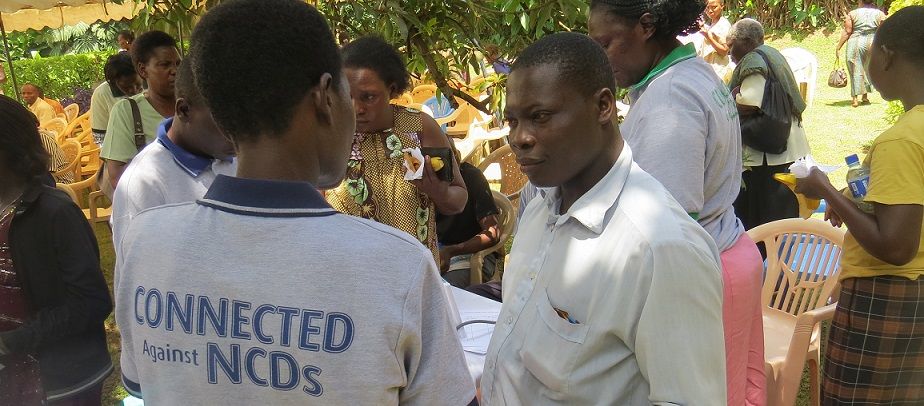05-07-2013
 Fun physical activity was brought to the centre of Vienna during the flash mob event on 4 July 2013. Photo: Dale Wightman
Fun physical activity was brought to the centre of Vienna during the flash mob event on 4 July 2013. Photo: Dale Wightman
On the first day of the WHO European Ministerial Conference on Nutrition and Noncommunicable Diseases in the Context of Health 2020, the participants agreed that strong political commitment, work across sectors and policy measures (including regulation and improvement of data and evidence) are all urgently needed to reverse the epidemic of nutrition-related noncommunicable diseases (NCDs).
During the opening session, Alois Stöger, Federal Minister of Health of Austria, echoed the principles of Health 2020 and underlined the importance of bringing policies to people, where they live and learn, enabling equal opportunities so that the healthiest choice is also the obvious choice for everyone.
In a video address, Margaret Chan, WHO Director-General, described the food industry as formulating foods that are so “irresistibly tasty” that people are encouraged to eat more than they need to satisfy their hunger. Population-wide obesity is a signal that something is wrong with the environment, she said.
The Conference brings together delegations from 47 Member States in the WHO European Region, including 28 ministerial delegations: an acknowledgement of the gravity of the nutrition challenges facing the Region, and the commitment of countries to address them.
Addressing a plenary session, Heinz Fischer, President of Austria, stated, “Strong political commitment, political will and leadership across the political sectors are needed to provide sufficient impetus to win the fight against NCDs. Governments have to include future-oriented health decisions in their policies across the whole government.”
Policy implementation on nutrition and physical activity
Reviewing the implementation of policy across the Region, Zsuzsanna Jakab, WHO Regional Director for Europe, noted that the blend of policies on nutrition and physical activity varies widely. Countries were doing well in adopting food-based dietary guidelines and providing nutritional information and education, and had made progress in areas such as reducing the marketing of foods to children and providing fruit and vegetables in schools.
“Yet the policy measures that demand more intervention from the state, notably measures that affect food prices and the use of colour-coded nutritional labelling, for example, are the ones where more countries have reported no action,” Ms Jakab added.
In his keynote speech at the first ministerial panel, Professor Philip James of the United Kingdom spoke of the need for a combination of policies to address increasing levels of overweight. He explained that “obesity is now the normal ‘passive’ biological response to our changed physical and food environment.”
He noted that media campaigns are the least effective intervention in combating obesity, but that a combination of regulatory controls, food labelling and nutrition activities in schools works. “We must transform our approach to food, using all the arms of government: fiscal policy, regulation and trade policy. If we did this, we would show the rest of the world,” he concluded.
Country reflections on nutrition policy
During the subsequent panel discussion, ministers and other high-level participants shared the policy interventions made by their countries, and reflected on the need to regulate food products.
- Slovenia had introduced its first policy on safe food in 2005, focused on physical activity introduced two years later and would bring a new school fruit scheme into 90% of schools in the next year.
- Finland emphasized the importance of health promotion and including health in all policy-making.
- France had introduced a range of measures to improve sport activities for young people, focused on how people move around in urban settings and encouraged health professionals to prescribe physical activity to patients. These measures emphasized the community’s responsibility to create the right environment.
- Ukraine thanked WHO/Europe for assistance in developing its action plan on NCDs. The country had introduced regulations to reduce salt and trans fat intake, as well as public information campaigns and training for health specialists.
- With a large portion of the population under 30 years old, Uzbekistan continued its long tradition of encouraging young people to be physically active. It had recently adopted new laws on food security, micronutrients, tobacco and alcohol.
- The Republic of Moldova had held its first national health forum in 2012, to improve key partners’ understanding of health issues and take a holistic approach to health.
On the issue of whether the food industry should be regulated or subject to voluntary agreements, many noted that evidence shows regulation to be more effective. Several participants indicated that regulation made issues clearer for industry, as everyone then played by the same rules. Some saw a combination of regulation with incentives – allowing industry to market its healthy products – as necessary, and the importance of involving the public in lobbying for change was noted.
Specific policies to tackle diet-related NCDs
During an afternoon session, Professor Carlos A Monteiro of Brazil spoke of “ultra-processed foods”. They tend to contain less protein, less dietary fibre, more free sugar, more total saturated fat and trans fat, more salt and less potassium than less processed foods, and encourage unhealthy ways of eating: on the move, snacking and aggressive eating. Ultra-processed foods are heavily marketed in countries across Europe.
Professor Monteiro argued that governments must introduce fiscal policies to make these foods less accessible, as well as policies to support long-established food systems, breastfeeding and traditional diets.
Following a ministerial panel debate, a key conclusion of the session was that strong regulation and monitoring are equally important for diet-related NCDs.
Yoga flash mob
Over 100 yoga enthusiasts and passers-by took part in an open flash-mob event at Heldenplatz in Vienna during the day, to emphasize how physical activity is fun and easy to integrate into daily routines, and can bring together people of all ages.
Press conference
Representatives of over 20 national and international media outlets attended the morning press conference. Zsuzsanna Jakab, WHO Regional Director for Europe, explained that she is optimistic that the obesity epidemic in the European Region will be addressed, but that this requires governments to take on legislation on food pricing and labelling, and industry to be involved in product formulation and labelling, ceasing to market foods high in fat, sugar and salt to children. Alois Stöger, Federal Minister of Health of Austria, explained the national perspective to journalists.
20 minutes and questions: salt, sugar, fat
At a lunchtime session, Michael Moss, journalist from “The New York Times” and Pulitzer Prize winner, spoke of the food industry’s tactics in food formulation. Arguing that the industry adds sugar, fat and salt to food to make it more appealing, and therefore more profitable, he commented, “With food high in salt, sugar and fat, we see patterns of compulsive intake every bit as strong as some narcotics.”

























